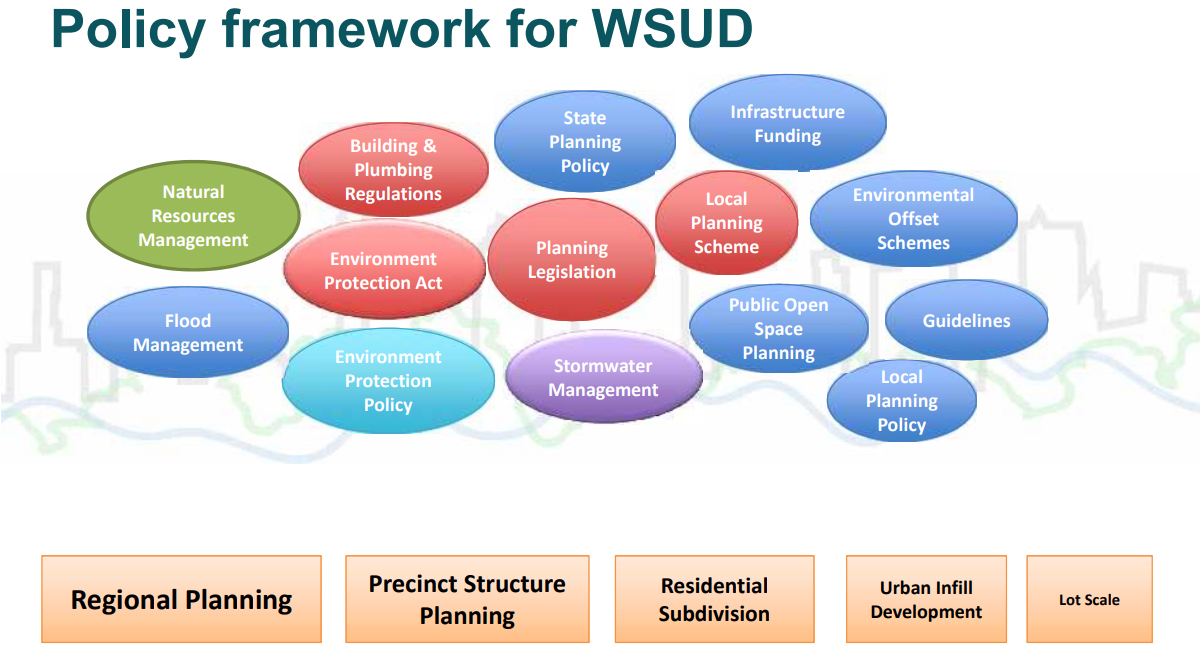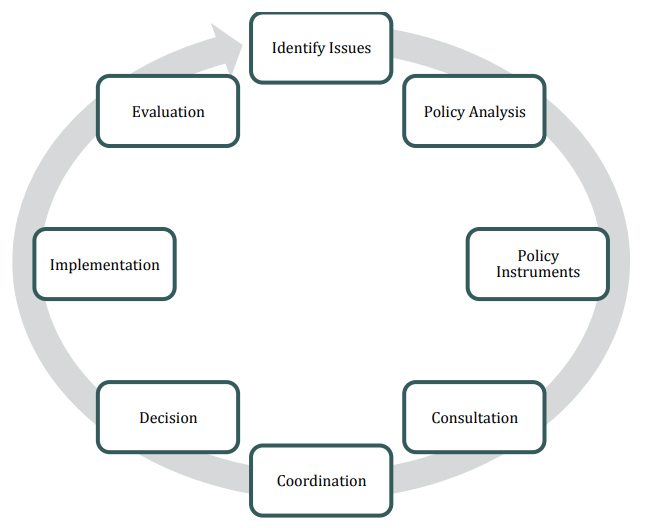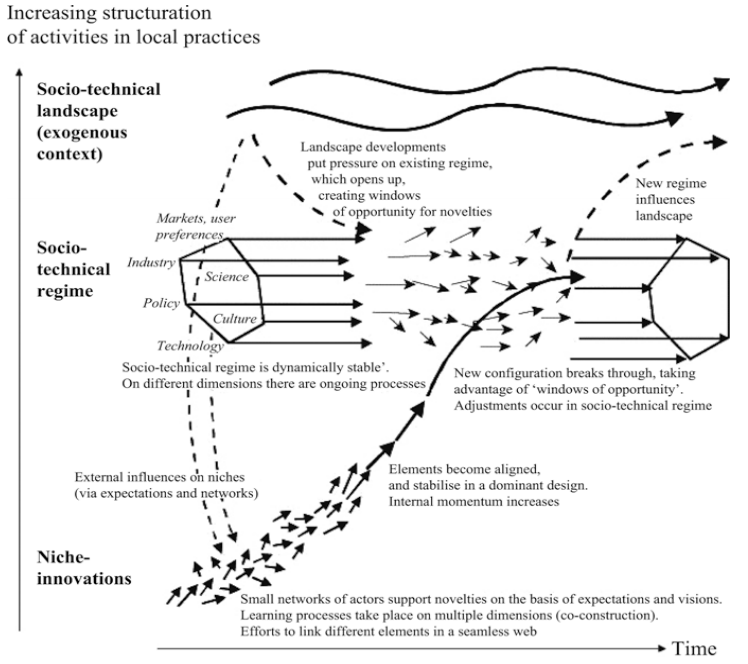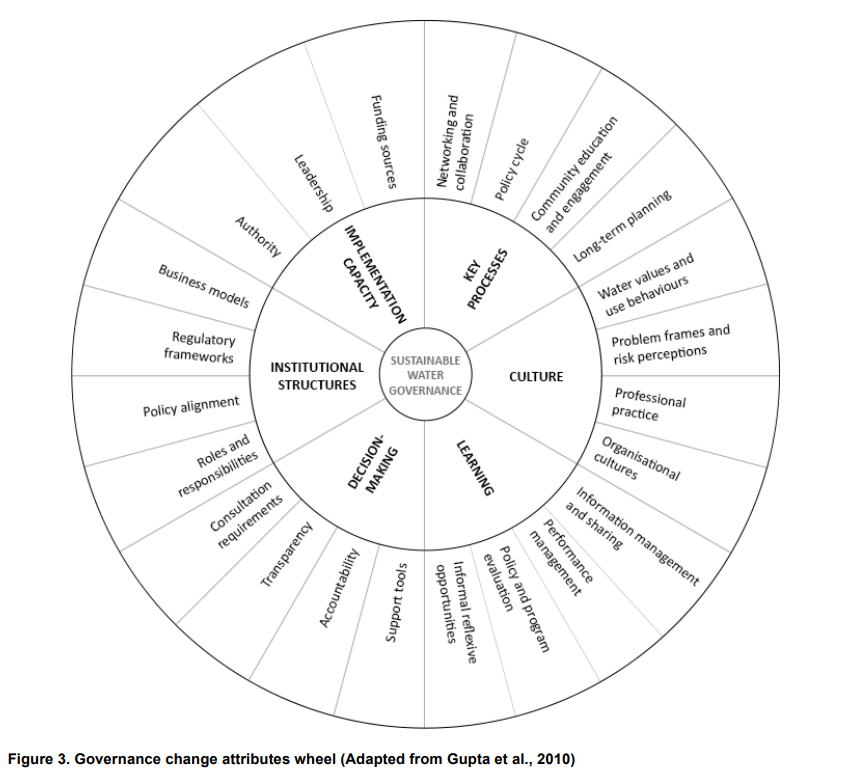Governance and policy
Contact
Introduction
CRCWSC research establishes the context, opportunities and constraints of governance and policy realms to support water sensitive outcomes.
Research findings and reports
Our research on governance and policy has identified some interesting findings:
- Policy changes need to occur incrementally to achieve water sensitive cities and governance should be based on the three phases of: initiation, experimentation and integration. (Governance structures and strategies to support innovation and adaptability)
- A water sensitive city made up of decentralised water systems involves multiple stakeholders working together to manage risk, however, research found that water practitioners only trust homeowners to manage the risk of rainwater tanks. (Risk governance in the water sensitive city: practitioner perspectives on ownership, management and trust).
- As a city transitions to being water sensitive, governance approaches need to transition from ‘decentralised’ and ‘informal’ to ‘formal’ and ‘centralised’ to be effective. (Configuring transformative governance to enhance resilient urban water systems).
- Co-governance models for sustainable urban water management require building institutional capacity, involving relevant stakeholders and a focus on building trust, capacity and long-term commitment. (Pursuing sustainable urban water management through co-governance – A case study of Marrickville Council).
- Australia still lacks a suite of best practice planning policy objectives, key performance indicators and standards. (Policy Framework for Water Sensitive Urban Design in 5 Australian Cities).
You will find a range of research reports on governance and policy under the categories below.
Governance
- Governance structures and strategies to support innovation and adaptability
- Risk governance in the water sensitive city: practitioner perspectives on ownership, management and trust
- Configuring transformative governance to enhance resilient urban water systems
- Pursuing sustainable urban water management through co-governance – A case study of Marrickville Council
- ‘Next Practice’ Governance for Water Sensitive Cities
- The interaction of risk allocation and governance arrangements in innovative urban stormwater and recycling projects
- Transforming Built Environments: Towards Carbon Neutral and Blue-Green Cities
- Framework, Procedure, and Tools for Comprehensive Evaluation of Sustainable Stormwater Management: A Review
Policy
- Policy Framework for Water Sensitive Urban Design in 5 Australian Cities
- Toward effective change in urban water policy: the role of collaborative governance and cross-scale integration
- Scientists versus policy-makers: building capacity for productive interactions across boundaries in the urban water sector
- Scientists and policy influence: a literature review
- Innovation through experimentation: designing policy change programs
- Mediating the science-policy interface: Insights from the urban water sector in Melbourne, Australia
- Cost-effective Strategies to Reduce Nitrogen and Phosphorus Emissions in an Urban River Catchment
- The Influence of Statutory Land Use Planning on Water Sensitive Design Practices
- Facilitating water sensitive urban development through planning integration
- A review of existing funding models, economic regulatory frameworks, policies and mechanisms
Research application
Our research on governance and policy has been applied to a range of projects:
- The governance model implemented for the Angus Creek Stormwater Harvesting and Reuse Scheme created the first scheme of its kind in New South Wales. The innovative self-financing governance model is able to fund ongoing operation and maintenance costs and employ an officer to oversee the project.
- How can we optimise the Victorian Planning Provisions to improve stormwater management? This report captures ideas for applying planning controls in Victorian cities and towns.
- A case study on the Fitzgibbon Chase development explores governance issues for decentralised water harvesting and treatment systems.
- The report ‘Enabling water sensitive urban development: planning and governance options for Perth’, details the constraints to innovation within the WA planning system and offers 11 reform options to enable better development outcomes.
- The report, ‘Enabling water sensitive greenfield development in Townsville’, examines the institutional arrangements that can impede water sensitive urban development practices and identifies 14 opportunities strengthen Townsville’s planning and governance systems to advance its water sensitive agenda.
Tools and guidelines
These tools and guidelines are informed by our governance and policy research:
- A series of guiding steps for policy makers and strategists to benchmark progress, reveal a city’s strengths and vulnerabilities and provide guidance on strategic actions to enable progress toward water sensitive management.
- This manual provides insight to help scientists influence policy and uncovers the obstacles, opportunities and how to exploit them.
Infographics
Infographic 1
Policy framework for WSUD (Choi L et al., 2015. Policy framework for WSUD in five Australian cities. Melbourne, Australia: CRC for Water Sensitive Cities, p. 5.)

Infographic 2
The policy cycle (Laing M, 2015. Scientists and policy influence: a literature review. Melbourne, Australia: CRC for Water Sensitive Cities, p. 13.)

Infographic 3
The socio-technical transition (Laing M, 2015. Scientists and policy influence: a literature review. Melbourne, Australia: CRC for Water Sensitive Cities, p. 38.)

Infographic 4
Governance change attributes wheel (Bettini Y and Head BW, 2015. Governance structures and strategies to support innovation and adaptability. Melbourne, Australia: CRC for Water Sensitive Cities, p. 11.)
